
News |
- US Fish & Wildlife Service Protects Polar Bear Habitat
- Clean Energy Common Sense by NRDC President
- Commonwealth Focuses on Climate Change
- Environmental Laws in Oilsands Need Enforcement
- Scientists Send Climate Change Letter to Harper
- Beverly Caribou Herd Declining
- Commonwealth Leaders Make Climate Declaration
- Tipping Points Warns of Climate Changes to Come
- SmartPrivacy for the Smart Grid, New Report Released
- US Engineers Accountable for Katrina Damages
- First Nations Have Less Environmental Protection
- Mining Report Calls for Quebec Reforms
| US Fish & Wildlife Service Protects Polar Bear Habitat | 14 December 09 |
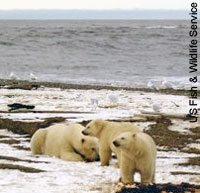 On October 22, 2009 the U.S. Fish and Wildlife Service announced a proposal to designate over 128 million acres of Alaskan coastline and waters as critical habitat for polar bears. On October 22, 2009 the U.S. Fish and Wildlife Service announced a proposal to designate over 128 million acres of Alaskan coastline and waters as critical habitat for polar bears."Proposing critical habitat for this iconic species is one step in the right direction to help this species stave off extinction," states Tom Strickland, interior assistant secretary for fish, wildlife and parks. "The greatest threat to the polar bear is the melting of Arctic sea ice caused by climate change." In a statement from Carl Pope, executive director of the Sierra Club, Pope states "We applaud the U.S. Fish and Wildlife Service for designating critical habitat for the polar bear. This is an important first step. Now, if we want America's polar bears to survive, we must also address global warming and eliminate the threat of offshore drilling." In 2008, the Department of the Interior listed the polar bear as a threatened species under the Endangered Species Act. The proposed polar bear habitat, required by the Endangered Species Act, follows an earlier decision by the Minerals Management Service to approve offshore oil drilling in key polar bear habitat in Alaska's Beaufort Sea. The proposed area currently includes land where oil and gas exploration is occurring. View October 22, 2009 The Sierra Club press releaseView October 22, 2009 MSNBC article View October 22, 2009 Reuters article Sources: The Sierra Club, MSNBC |
|
 Print version Print version |
Top |
| Clean Energy Common Sense by NRDC President | 9 December 09 |
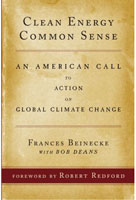 President of the Natural Resources Defence Council Frances Beinecke, released her new book Clean Energy Common Sense: An American Call To Action on Global Climate Change, November 10 2009. This book educates Americans about carbon pollution and how to stop it. President of the Natural Resources Defence Council Frances Beinecke, released her new book Clean Energy Common Sense: An American Call To Action on Global Climate Change, November 10 2009. This book educates Americans about carbon pollution and how to stop it.Beinecke is trying to coax American to "listen to the most authoritative experts in the field", quoting from NASA, the Marine Corps, the Department of Energy and the Environmental Protection Agency. The books goal is to show that global warming is a real crisis that American can rally around to improve the economy and lifestyle. Beinecke is hoping the books release will encourage support for climate negotiations at Copenhagen in December. View November 10, 2009 NRDC Press ReleaseView Q & A with Frances Beinecke (PDF) View November 10, 2009 Statement of Frances Beinecke (PDF) View General Book Information (PDF) View further information on Manitoba Wildlands Source: NRDC |
|
 Print version Print version |
Top |
| Commonwealth Focuses on Climate Change | 7 December 09 |
 In the past, the Commonwealth nations have suspended countries for human rights violations, and during the last weekend in November 2009 campaigners, politicians and scientists proposed to suspend Canada because of its climate policy. In the past, the Commonwealth nations have suspended countries for human rights violations, and during the last weekend in November 2009 campaigners, politicians and scientists proposed to suspend Canada because of its climate policy."Countries that fail to help (tackle global warming) should be suspended from membership, just like those that breach human rights," states Clare Short, the former International Development Secretary, according to The Guardian. "If the Commonwealth is serious about holding its members to account, then threatening the lives of millions of people in developing countries should lead to the suspension of Canada's membership immediately," states Saleemul Huq, a lead author for the Intergovernmental Panel on Climate Change. Canada signed the Kyoto Protocol in 2000, pledging to reduce greenhouse gas emissions by six per cent from 1990 levels by the commitment period ending in 2012. By 2007, its emissions were 34 per cent above its reduction target. View November 27, 2009 COP15 articleView November 27, 2009 CBC article View further information on Manitoba Wildlands Source: COP15.dk, CBC.ca |
|
 Print version Print version |
Top |
| Environmental Laws in Oilsands Need Enforcement | 7 December 09 |
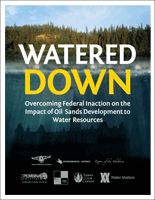 A new report, Watered Down: Overcoming Federal Inaction on the Impact of Oil Sands Development to Water Resources, urges the Canadian Government to enforce environmental laws and regulations in the oilsands, and to set new pollution standards for oilsands development. A new report, Watered Down: Overcoming Federal Inaction on the Impact of Oil Sands Development to Water Resources, urges the Canadian Government to enforce environmental laws and regulations in the oilsands, and to set new pollution standards for oilsands development.Produced with the support of The Pembina Institute, Keepers of Athabasca, Environmental Defence, Sierra Club and many more, this report contains scientific, non-governmental and First Nations communites' content presented at federal hearings earlier in 2009 about impacts on Canada's water resources from oil sands activity. The oilsands pollute freshwater sources for people along the Athebascan River and its tributaries from Fort Chipewyan all the way up to Yellowknife and the Arctic Ocean. This pollution has the potential to contaminate the entire Mackenzie River Basin. The report indicates 10 areas where Canada's Government has failed to: enforce water diversion standards; regulate toxic pollution; prosecute leaking tailing ponds; and also failed to implement oilsands specific legislation. Watered Down recommends that the Government of Canada use its legislative responsibility to regulate the oilsands industry, especially its impacts on freshwater resources and aquatic ecosystems. View October 2009 Watered Down report (PDF)View November 23, 2009 Water Matters press release View November 23, 2009 Water Matters full story View November 24, 2009 CBC News press release Sources: CBC, Water Matters |
|
 Print version Print version |
Top |
| Scientists Send Climate Change Letter to Harper | 7 December 09 |
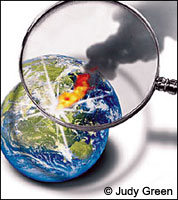 Over 500 of Canada's leading scientists have issued an open letter to Prime Minister Stephen Harper warning that global warming is happening much faster than previously estimated and that government needs more aggressive targets in reducing greenhouse-gas emissions. Over 500 of Canada's leading scientists have issued an open letter to Prime Minister Stephen Harper warning that global warming is happening much faster than previously estimated and that government needs more aggressive targets in reducing greenhouse-gas emissions.The letter, circulated by WWF-Canada and released December 3rd, is signed by some of Canada's most internationally recognized environmental researchers. The letter states that Canada's current policy, which amounts to a cut in greenhouse-gas emissions by 2.7 per cent below 1990 levels by 2020, will not be enough to forestall rapid climate change. The letter goes on to state that greater reductions, in the range of 25 to 40 per cent, will be required to keep global warming to less than 2 degrees above pre-industrial levels. "We're seeing no movement on the part of our politicians and yet pretty well all of the science out since about 2007 has indicated that climate change is moving faster than we thought," states David Schindler, professor at University of Alberta who helped draft the letter. The letter was released 4 days before start of the UN Climate Change conference in Copenhagen. View December 5, 2009 The Globe and Mail articleView December 4, 2009 Planet Ark article View Scientists' Letter to Prime Minister Stephen Harper Source: Globe and Mail, WWF-Canada |
|
 Print version Print version |
Top |
| Beverly Caribou Herd Declining | 7 December 09 |
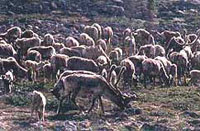 The Canadian Northwest Territories government has stated that the 2007 and 2008 reconnaissance surveys at the peak of calving season shows the Beverly caribou numbers have sharply dropped. The Canadian Northwest Territories government has stated that the 2007 and 2008 reconnaissance surveys at the peak of calving season shows the Beverly caribou numbers have sharply dropped. The herd has been showing signs of decline for several years. During a 2007 survey, only 189 adult female caribou were counted on the Beverly calving ground and only 93 cows were seen during June 2008. This is a sharp decrease from 5,737 cows seen in 1994. "Caribou-wise, it was very depressing," says Beverly and Qamanirjuaq Caribou Management Board (BQCMB) member Dennis Larocque. Outside the calving ground, Larocque saw only one caribou and almost no caribou tracks. A mix of factors may be to blame for the population drop, such as mineral exploration and development, hunter harvest, changes in habitat (including winter range being lost to forest fires), parasites and diseases, predation and climate change. Five other North West Territories barren-ground caribou herds (Porcupine, Cape Bathurst, Bluenose West, Bluenose East, and Bathurst) have also recently seen declines. View Summer 209 Beverly and Qamanirjuaq Caribou Management Board newsletterView July 2009 The Beverly and Qamanirjuaq Caribou Management Board press release View Manitoba Wildlands' Caribou Strategies page View further information on Manitoba Wildlands Source: Caribou News in Brief, The Beverly and Qamanirjuaq Caribou Management Board |
|
 Print version Print version |
Top |
| Commonwealth Leaders Make Climate Declaration | 2 December 09 |
 During its November 27-29 summit Commonwealth heads of government, representing 53 countries, met in Port of Spain to review global, political and economic developments. Members reached the Port of Spain Climate Change Consensus and produced the Commonwealth Climate Change Declaration to encourage countries to commit to a legally-binding agreement to fight climate change. The Declaration comes just before the UN Conference of the Parties in Copenhagen in December, 2009. During its November 27-29 summit Commonwealth heads of government, representing 53 countries, met in Port of Spain to review global, political and economic developments. Members reached the Port of Spain Climate Change Consensus and produced the Commonwealth Climate Change Declaration to encourage countries to commit to a legally-binding agreement to fight climate change. The Declaration comes just before the UN Conference of the Parties in Copenhagen in December, 2009.The declaration has 14 points discussing the purpose for the declaration, reaffirmation of commitments, the opportunities Copenhagen negotiations present. The Commonwealth countires are clearly stating that an internationally legally binding agreement is essential to reducing emissions, and needs to come out of Copenhagen. The declaration relays the commonwealth's commitments to "focus efforts on achieving the strongest possible outcomes", including creating a fund to financially assist climate change efforts. Canadian Prime minister Steven Harper attended the Commonwealth summit, and supports the recent Declaration. In a recent news article he stated he is, "looking forward to seeing a comprehensive agreement in Copenhagen". View November 28, 2009 The Commonwealth Climate Change DeclarationView November 28, 2009 Commonwealth article View November 28, 2009 CTV article View CHOGM (Commonwealth Heads of Government Meeting) 2009 website Sources: Canadian Press, CHOGM, CTV news |
|
 Print version Print version |
Top |
| Tipping Points Warns of Climate Changes to Come | 2 December 09 |
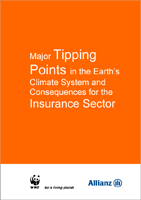 A report by WWF and Allianz, Major Tipping Points in the Earth's Climate System and Consequences for the Insurance Sector, released November 23rd, states that the world's ecosystems are close to reaching temperature thresholds or "tipping points" that can unleash devastating environmental, social and economic changes. A report by WWF and Allianz, Major Tipping Points in the Earth's Climate System and Consequences for the Insurance Sector, released November 23rd, states that the world's ecosystems are close to reaching temperature thresholds or "tipping points" that can unleash devastating environmental, social and economic changes.Without immediate climate action, sea level rise on the East Coast of the USA, the shift to an arid climate in California, disturbances of the Indian Summer Monsoon in India and Nepal or the dieback of the Amazon rainforest due to increasing drought, are likely to affect hundreds millions of people and cost hundreds of billions of dollars. The study explores impacts of these "tipping points," including their economic consequences and implications for the insurance sector. "If we don't take immediate action against climate change, we are in grave danger of disruptive and devastating changes," states Kim Carstensen, the Head of WWF Global Climate Initiative. "Reaching a tipping point means losing something forever. This must be a strong argument for world leaders to agree a strong and binding climate deal in Copenhagen in December." View November 23, 2009 WWF articleView November 23, 2009 Allianz Group article View WWF & Allianz Report: Major Tipping Points in the Earth's Climate System and Consequences for the Insurance Sector (PDF) View further information on Manitoba Wildlands Sources: WWF, Allianz Group |
|
 Print version Print version |
Top |
| SmartPrivacy for the Smart Grid, New Report Released | 1 December 09 |
 The Information and Privacy Commissioner of Ontario recently released a report SmartPrivacy for the Smart Grid. It focuses on building policy for the potential upgrade of the US power grid system from its current overburdened state to a "smart" system. The Smart Grid will monitor power usage at the appliance level, saving energy and consumer cost. The smart grid has the potential to be able to collect information on individual energy consumption use and patterns that could violate individual privacy. The Information and Privacy Commissioner of Ontario recently released a report SmartPrivacy for the Smart Grid. It focuses on building policy for the potential upgrade of the US power grid system from its current overburdened state to a "smart" system. The Smart Grid will monitor power usage at the appliance level, saving energy and consumer cost. The smart grid has the potential to be able to collect information on individual energy consumption use and patterns that could violate individual privacy.SmartPrivacy for the Smart Grid describes Smart Grid benefits and explores questions regarding privacy issues. A Privacy Impact Assessment was done by an American task group that found the privacy implications of the smart grid are not fully understood. There is a lack of formal privacy policies, standards or procedures and that the potential exists for personal information to be collected by both utilities and third parties. SmartPrivacy for the Smart Grid recommends that privacy policy can be built into the smart grid at the conception stage, by making these policies the default in all physical, administrative and technological aspects of the system. View November 17, 2009 SmartPrivacy for the Smart Grid press release (PDF)View November 2009 SmartPrivacy for the Smart Grid Report (PDF) View November 2009 Future of Privacy Forum View October 9, 2009 Red Tape Chronicles press release Sources: SmartPrivacy for the Smart Grid Report, Future of Privacy Forum |
|
 Print version Print version |
Top |
| US Engineers Accountable for Katrina Damages | 30 November 09 |
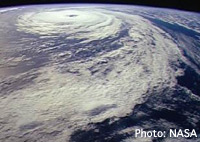 In New Orleans, the District Court of Louisiana's Judge Duvall ruled the US Army Corp of Engineers, those responsible for the Mississippi River-Gulph Outlet, a shipping channel, were negligent in their construction of the Reach 2 Levee. Therefore the Corp is responsible for flooding of the Lower Ninth Ward of New Orleans and neighbouring St. Bernard Parish and are liable for loss of life and property. In New Orleans, the District Court of Louisiana's Judge Duvall ruled the US Army Corp of Engineers, those responsible for the Mississippi River-Gulph Outlet, a shipping channel, were negligent in their construction of the Reach 2 Levee. Therefore the Corp is responsible for flooding of the Lower Ninth Ward of New Orleans and neighbouring St. Bernard Parish and are liable for loss of life and property.Judge Duvall's ruling is important for a number of factors. It confirmed an engineering flaw that has been well documented. It signalled to the Army Corps that they are to be held accountable and that they cannot find immunity in government policy (Flood Control Act of 1982). It gives strength to the National Environmental Policy Act and will open the door for lawsuits nationwide. View November 18, 2009 US District of Louisiana Court Ruling (PDF)View November 23, 2009 Sierra Club press release View November 19, 2009 Earth Magazine press release Sources: Sierra Club, US District Court of Louisiana |
|
 Print version Print version |
Top |
| First Nations Have Less Environmental Protection | 30 November 09 |
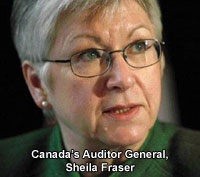 In the 2009, Auditor General of Canada, [Fall Report], Ms. Sheila Fraser stated that Indian and Northern Affairs Canada (INAC), and to a lesser extent Environment Canada, routinely fail to regulate environmental threats on reserves. In the 2009, Auditor General of Canada, [Fall Report], Ms. Sheila Fraser stated that Indian and Northern Affairs Canada (INAC), and to a lesser extent Environment Canada, routinely fail to regulate environmental threats on reserves."As a result, people living on reserves have significantly less protection from environmental threats than other communities," says Ms. Fraser. The report stated that contrary to regulations under the Indian Act, most landfill sites and sewage treatments on reserves operate without permits, monitoring, or enforcement by INAC. Septic systems, wastewater discharges, and hazardous waste are some of the environmental threats not subject to regulation on reserves, but which are strictly controlled off reserves. The Auditor General also found that despite INAC's commitment to transfer more control to First Nations over management of their lands and resources, their access to land management programs and training is limited. The INAC agreed with all of the comments made in the Auditor General's Report and states throughout the report that they will work to develop strategies to identify and close regulatory environmental gaps on reserves. View 2009 Fall Report of the Auditor General of CanadaView November 3, 2009 Office of the Auditor General press release View November 15, 2009 Intercontinential Cry article Sources: Office of the Auditor General, Intercontinental Cry |
|
 Print version Print version |
Top |
| Mining Report Calls for Quebec Reforms | 27 November 09 |
 Canada's largest non-profit environmental law organisation, has released a study, Pour que le Québec ait meilleure mine; Reforeme en profondeur de la Loi sur les mines du Quebec. The study demonstrates the need for reform of the outdated Quebec Mining Act to make mining a thing Quebeckers can be proud of. Canada's largest non-profit environmental law organisation, has released a study, Pour que le Québec ait meilleure mine; Reforeme en profondeur de la Loi sur les mines du Quebec. The study demonstrates the need for reform of the outdated Quebec Mining Act to make mining a thing Quebeckers can be proud of.The study is written by lawyers and experts trying to protect Quebeckers from effects of badly managed mines. They don’t want citizens paying the bill for environmental rehabilitation of contaminated mines. They want to remove the precedence of mining rights over citizen and community rights and give Quebeckers powers for sustainable regional development. These are rights the existing archaic Mining Act did not provide for. The report advises that mines pay for pollution they create, that there are obligatory Environmental Assessments that includes a public review process (not included previously) for all Mines. Mandatory back-filling of open pits, a moratorium on the exploration and exploitation of uranium, and respect for the rights and interests of the Aboriginal Communities must be part of the New Mining Act. The study comes just before an overhaul of mining legislation in Quebec is tabled at the National Assembly. View November 5, 2009 Ecojustice press releaseView November 6, 2009 Montreal Gazette article View Quebec's Mineral Strategy 2009 (PDF) View October 2009 Ecojustice's report Sources: Ecojustice |
|
 Print version Print version |
Top |


 RSS Feeds:
RSS Feeds: